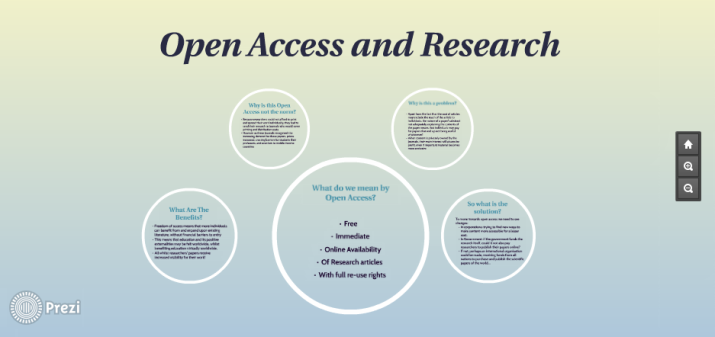Please click here for presentation: http://tinyurl.com/l6h7vry
In the 3rd century BC, the Library of Alexandria was constructed, seeking to collect literature and papers of the world to act as a center for learning, drawing many of the time’s most notable scholars to its halls.
Today, with the ability to share knowledge so freely with only a computer and internet connection required, one would have thought this concept could have been reproduced on a worldwide scale, yet still as per Shockey and Eisen (1), prices of scientific Journals continue to rise in price in proportion to interest rates year on year, making them less accessible to students and libraries. The issue that arises is that scientists need to be able to make their work as available as possible, whilst still being compensated for their work.
While platforms such as Elsevier seek to combine papers from multiple Journals, aggregating them and selling complete access to universities, you may still only access this material if you belong to an establishment that subscribes to the content. The importance of universal education, however, lies in the assumption that the personal returns to education are in fact less than that gained by society, affirmed by Moretti (2). This spillover effect contributes to the belief that universally accessible information and education may in fact be more beneficial when supplied as a public good (3) than being privately profited from by Journals.
Open access, whilst making content free for end users, must come at a cost to someone. As Geib (4) writes, this often comes down to the author themselves to cover their research or by way of a grant. However as the government provides funding for universities for research already, there exists the possibility to cut out the middle-man, in the form of private Journals, meaning that the state can both fund and publish the work of its students.
While this may seem beneficial to authors and society, it remains the case that papers must be reviewed by the quality of their content before publication, and while projects such as Wikipedia itself have shown that a free access source of information may be successful in providing high quality content, university papers will remain more complex and therefore more difficult to screen for quality issues when submitted in large quantities.
If a sufficient peer-review system can be put in place, universal Open Access may yet become a reality.
Words: 394
Sources:
(1) Open Access Explained! – Piled Higher and Deeper (PHD Comics)
(2) Estimating the Social Return to Higher Education: Evidence From Longitudinal and Repeated Cross-Sectional Data – Enrico Moretti
(3) Public Good – Wikipedia
http://en.wikipedia.org/wiki/Public_good
(4)Advantages and Disadvantages of Open Access – Adam Geib
http://www.edanzediting.com/blog/advantages_and_disadvantages_open_access#.VUZ6JvlViko

Hi Jens, great blog post this week. You have made some great points regarding open access and I was wondering if you have considered the effect of ethical implications on the researchers? This article (1) suggests that many individuals see publishing their work as ‘open access,’ ethical and moral. I wonder if you think it is fair to question a content creator’s ethics when they decide not to publish under open access. If they choose to use their funding to hire a grad student, rather than publish work in open access, should they feel they are choosing the unethical route? What are you views on this? Are researchers stuck between a rock and a hard place when it comes to open access? I think open access is a great idea, but I fear without a structural or cultural change the current system is turning many content creators against open access.
(1) http://www.theatlantic.com/technology/archive/2014/12/free-access-to-science-research-doesnt-benefit-everyone/383875/
LikeLike
Leigh I’m terribly sorry but somehow I managed to miss this comment!
I believe the issue of funding, especially in PhD papers is already flawed, in that students may already be shoehorned into writing up papers that they can feasibly get funding for, which may mean changing the direction of a project towards one more oriented to benefiting an organisation by providing research that will allow more business opportunities. Of course in some ways we can say that it’s already great that businesses are in this way funding research, and there are positives to this in general, however scientifically theoretical papers, and those seeking to move forward research in a given field, but with no clear business opportunity may naturally find themselves less able to find a suitable source of funds.
To be honest I think it’s a really complex dilemma to solve. We can’t just expect the state to foot the costs for all research papers that may not prove fiscally fruitful in future, however the alternative we currently work with is by no means perfect either. For this reason I really do believe that if there is no better alternative for a grad student to fund their research, there should be no shame in making access to their work paid. On the other hand, given this, again, it will lead to open access papers being in general, especially at the PhD level, more likely to be those more likely to have gotten funding.
As the open access video states, we need to try experimenting with different formats of sharing scientific papers until we find a way that can equally benefit providers of funded or unfunded work, and I hope such a system could be implemented in future.
LikeLike
[…] thought that Jens really highlighted what is for me the main concern in regards to current access to Journal […]
LikeLike